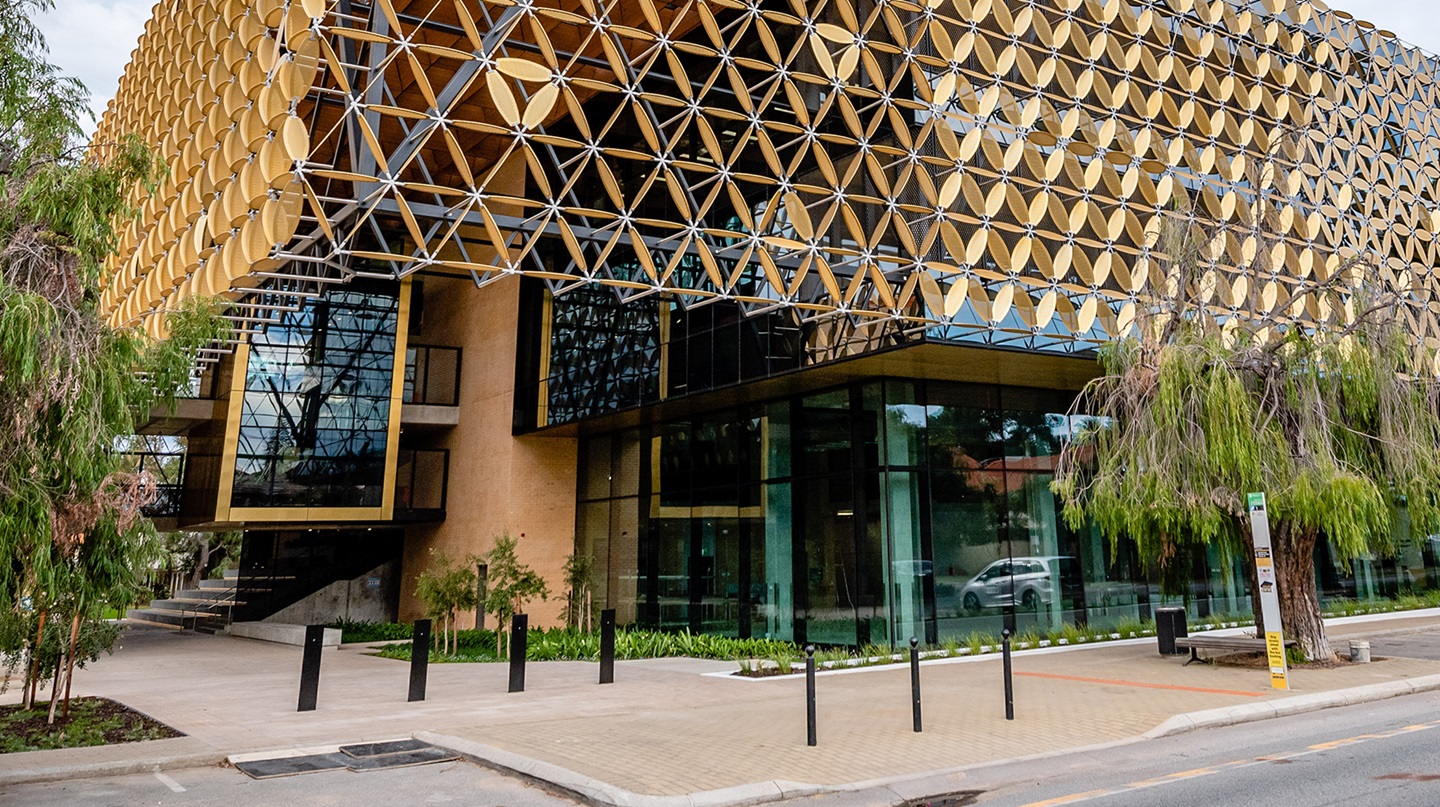Career options for engineers are extremely wide and varied. Engineers design, invent, build and innovate to solve real-world problems, and they help shape the world in so many different ways. You’re onto a winner if you choose to study Engineering!
It's pretty telling that engineering is the most commonly held degree among the Fortune 500 CEOs – the CEOs of companies such as Google, Microsoft, Amazon and Tesla Motors are all engineers. It seems the focus on problem-solving, analytical skills and numeracy make for a perfect management skillset!
The right engineering specialisation for you…
As technology evolves, engineering career opportunities continue to grow and change. With so many types and subtypes of engineering it can seem overwhelming to carve out your path within the field. Largely, which engineering specialisation you pick will define your career opportunities, so be led by your interests and passions.
We’ve put together a roundup of UWA’s engineering specialisations and which type of careers they might lead to. All of these specialisations are available within UWA's four-year Bachelor of Engineering (Honours) degree.
Automation and Robotics Engineering
Combining relevant aspects from all engineering disciplines, software development, electronic hardware design and mechatronics, Automation and Robotics Engineering covers the principles, design and operation of industrial robot manipulators, as well as intelligent autonomous robots and self-driving vehicles. Robotics, automation and Industry 4.0 will provide some of the most exciting opportunities and biggest challenges of our times. With new technologies being conceived every day, this is a rapidly evolving, exciting field that pushes the boundaries of what's possible.
This engineering specialisation is right for you if you’re interested in…
- How robots and automated machines will shape our future
- Innovation and creating the next intelligent invention
- Designing, building, testing and maintaining complicated machines
- Programming, coding, gadgetry and computer algorithms
Where do automation and robotics engineers work?
Automation and robotics engineering is a rapidly growing field that plays a huge role across industries worldwide. Advanced robots and automated systems are appearing all over the place and transforming the way we live, work and play. You could end up designing and developing intelligent systems for sectors including manufacturing, healthcare, transport, construction, telecommunications, entertainment and space exploration.
You could be designing systems to optimise processes in industry or to make things safer. The application of this area is broad – perhaps you’ll work on single-action industrial robots in factories or on more involved projects such as pilotless drones, unmanned vehicles and robots in sub-sea exploration or medical and rescue robots.
Biomedical Engineering
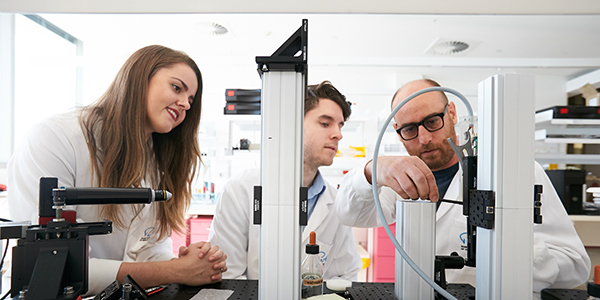
Biomedical Engineering puts engineering design and principles together with computing, mathematics, life sciences and medicine to improve diagnosis, treatment and prevention of disease and disability. The innovations and impacts in this field are limitless – you could be working on the next bionic eye, microscope in a needle, implants to control epilepsy or tissue regeneration for patients recovering from cancer (all biomedical tech innovations).
This engineering specialisation is right for you if you’re interested in…
- Fusing your passion for engineering with healthcare
- Creating cutting-edge medical technology that improves and saves lives
- The design and development of medical products
- Making a difference in patient's clinical outcomes and healthcare efficiencies
Where do biomedical engineers work?
With an ever-increasing demand for technological advances within the healthcare industry, biomedical engineers work at the frontline of next-generation healthcare solutions and research. They often work in hospitals, medical manufacturing firms, biomedical labs, and pharmaceutical companies. They may also work for research facilities and universities.
As a biomedical engineer, you’ll typically work with medical professionals to investigate, research and design ways to improve health care and medical services. The opportunities are diverse – you could develop instruments and equipment such as dialysis machines or incubators to aid patients' clinical outcomes or design rehabilitation equipment to improve the quality of life for people with disabilities.
Chemical Engineering
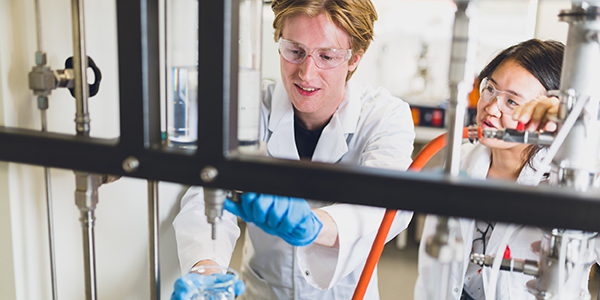
Chemical Engineering equips you with the skills and knowledge to design sustainable chemical processes, equipment and products to improve society and the environment.
This engineering specialisation is right for you if you’re interested in…
- Taking on the challenge of turning raw materials into useful products
- The chemical processes behind producing everyday items such as petrol, pharmaceuticals, fertilisers, washing detergents, lipstick and more
- Developing and designing chemical manufacturing processes
- Studying chemistry and combining technical knowledge in this area with engineering, biochemistry and materials science
Where do chemical engineers work?
Career options within chemical engineering are extensive and some of the highest-paid in the industry. Chemical engineers often work in sectors such as oil and gas, mineral processing, water and waste management, and renewable and sustainable energy. Additionally, there are opportunities in pharmaceutical and food production.
As a chemical engineer you’ll be involved in creating products like plastics or pharmaceuticals. You could work on biofuel production or develop innovations in recycling, treating disease, cleaning water, and generating energy and food production.
In these different fields of chemical processing, you could work for specialised design companies, on-site at process plants and refineries, or in laboratories and universities undertaking chemical process research.
Civil Engineering
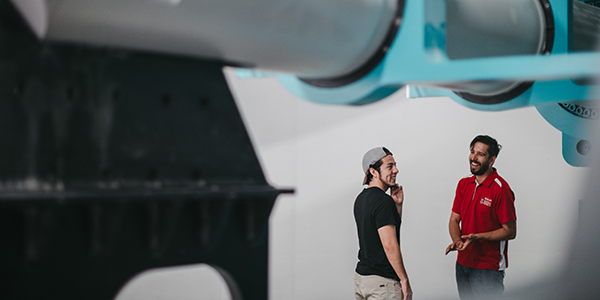
Civil Engineering focuses on the plan, design, construction and maintenance of projects such as commercial and residential buildings, roads, railways and train stations, airports, bridges, canals, harbours, dams, irrigation, drainage and flood mitigation systems and offshore structures.
This engineering specialisation is right for you if you’re interested in…
- Planning things – whether it’s a building or a road system all civil engineering projects require detailed plans and processes
- Building major infrastructure that will exist for years to come
- Creating a better world through sustainable and environmentally aware buildings and systems
- Specialised areas such as structural mechanics, geomechanics, rock mechanics and hydraulics
- Combining strong technical skills with creative design
- Using applied maths and calculations
Where do civil engineers work?
Civil engineers have a vital role in building the infrastructure for our expanding cities and communities around the world. You’ll typically work in sectors such as construction, infrastructure, consulting, transport, project management, mining, environmental control, water, waste and energy. Often these roles will be in offices or building sites.
Electrical and Electronic Engineering
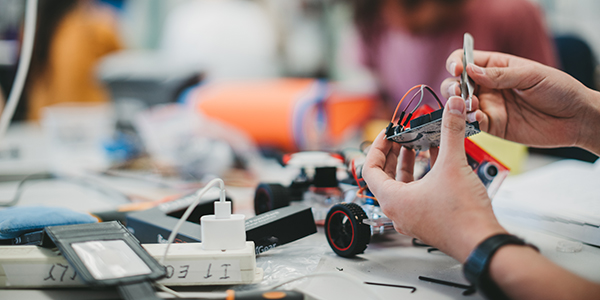
Electrical and Electronic Engineering spans from the nanometres-thick scale of advanced electronic devices to the kilometres-long scale of power transmission, and everything in between. Develop the skills to respond to future demands in renewable power solutions for sustainable energy, wireless communications that bring people together, and electrical systems and electronic devices that will transform how we live – from the smartest phone to the fastest electric car.
This engineering specialisation is right for you if you’re interested in…
- How electrical devices work
- How electrical energy is produced and used in homes, the community and industry
- Designing equipment and systems that transform lives and provide essential services such as power, communications and electronics
- Being at the forefront of future technologies in industries such as transport, communications and healthcare.
Where do electrical and electronic engineers work?
There is a strong demand for electrical and electronic engineers to meet the need for sustainable energy and transport solutions, and to address key challenges from the rapid expansion of the technological sector. Career opportunities exist in innovative fields such as developing sustainable energy solutions, designing technologies to improve healthcare, creating systems that support industry or communities, and robotics and automation.
Environmental Engineering

Environmental engineers apply their understanding of natural systems and engineering skills to find creative solutions to pressures facing our environment. By studying Environmental Engineering you’ll gain a detailed knowledge of environmental management and design, ecological engineering and design, environmental modelling, contaminant fate and transport, hydrology, environmental fluid mechanics and more.
This engineering specialisation is right for you if you’re interested in…
- Bringing about real change by developing innovative solutions for environmental challenges
- Combining knowledge of environmental sciences and engineering principles
- Researching and developing new technologies and techniques to improve environmental standards
- Evaluating the environmental and social impacts of engineering projects
Where do environmental engineers work?
The growing need for environmental protection has created a high demand for environmental engineers. Environmental engineers are employed in sectors such as construction, infrastructure, transport, project management, mining, environmental control, forestry, water, waste and energy, or in government agencies. Opportunities also exist for self-employment or work with consulting firms.
You’re likely to be working in offices or laboratories, or in the field at construction and mine sites, to control pollution, minimise waste or to oversee clean-up and rehabilitation operations in polluted environments.
Mechanical Engineering

Mechanical Engineering involves the production and use of heat and power for the design, invention and operation of machines and devices of all types. You’ll explore theories, methods and practices used in sound and vibration, control, thermodynamics, fluids, robotics, computer simulation and materials.
This engineering specialisation is right for you if you’re interested in…
- How things work and being hands-on in finding solutions and innovations
- Moving parts, machines, mechanics, weight and strength of materials
- Designing systems and machinery that generate power, make products, move things and help in building
Where do mechanical engineers work?
As a mechanical engineer, you'll develop broad-based knowledge which will enable you to move easily between industries. Career pathway options range from offshore and petroleum engineering through to the building, mining, mineral processing, construction, power, automotive, food production, defence and aerospace-manufacturing industries. In these areas, you will design and oversee the development, installation, operation and maintenance of machinery, solve practical engineering problems and improve efficiency.
Mining Engineering
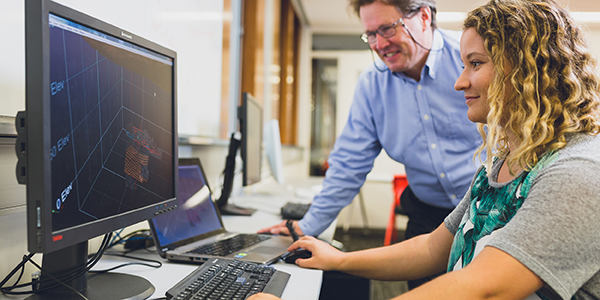
Mining – extracting essential commodities from the earth, to process them into materials that can provide the world with a better standard of living – is at the heart of our modern society. It therefore must be done in a safe, environmentally and ethically responsible manner. As a mining engineer, you'll be responsible for deposit evaluation, mine design, mine production and environmental management, all underpinned by rapid technological advancement.
You’ll gain detailed knowledge of surface mining, underground mining, rock mechanics and mine design, with exposure to geology, data science, Python coding, finance, and management.
This engineering specialisation is right for you if you’re interested in…
- How minerals are extracted from the earth and what happens afterwards
- Investigating mineral deposits and collaborating with geologists and economists
- Technical, operational-focused, hands-on engineering, sometimes requiring time in the field and remote locations
- Designing, installing and supervising the use of mining machinery and equipment
- High-tech automation systems, specialist computer software and surveying equipment
- Designing, implementing and coordinating safety and environmental programs
Where do mining engineers work?
Engineering roles in mining are often lucrative and travel opportunities are high. As a mining engineer, you may work as a technical specialist with a service company, as a consultant (e.g. blasting, software), in mine management and production, in banking or finance, in research, or in the government sector.
Software Engineering

Software Engineering involves the design, development, testing, deployment, maintenance and evaluation of complex computer software systems. You will also learn about advanced topics in mobile computing, cloud computing and artificial intelligence. Software engineers are often the creative minds behind computer programs and software.
This engineering specialisation is right for you if you’re interested in…
- Technology and the incredible benefits it can bring to the world
- Troubleshooting to make a program or system work as intended
- The creative process of programming and programming languages
- Critical thinking to design effective software solutions
- Handling complex code, algorithms and the detail behind computer systems
Where do software engineers work?
The specific roles software engineers take on evolve rapidly, reflecting new areas of specialisation and changes in technology. There are opportunities for software engineers in almost every industry, from large government organisations and dedicated software companies, to small startup companies, or providing software solutions in a variety of fields, such as entertainment, finance, mining, commerce or health.
As a software engineer, you may develop robotic software to be used in large mining equipment, create mathematical modelling programs to track the spread of disease, use computer-aided techniques to review, test and validate financial data and calculations, or analyse the security of IT security frameworks in large corporations.
Still need help deciding?
Don’t worry, throughout your studies, our Engineering and Mathematical Sciences Student Office will support you with any course-related or engineering specialisation queries. You can easily book an appointment with a student adviser or drop in for a chat.
We also run special events where you can talk with academics and students from each engineering area and make an informed decision. Once you’ve decided on your Engineering specialisation, be sure to visit our employability website for more info on how to prepare for your future career. All our job-building resources are available to students on campus and online.

